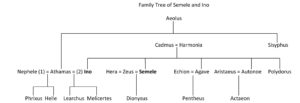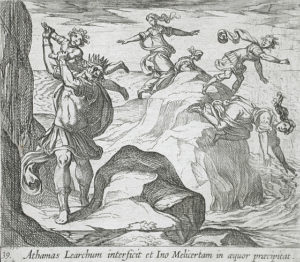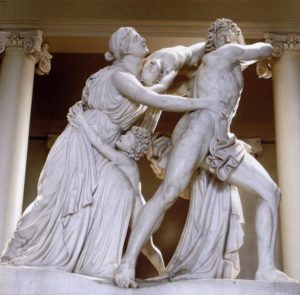λόγοι δὲ εἰσιν ἐς τὰς πέτρας, αἳ κατὰ τὸ στενὸν τῆς ὁδοῦ μάλιστα ἀνέχουσιν, ἐς μὲν τὴν Μολουρίδα, ὡς ἀπὸ ταύτης αὑτὴν ἐς θάλασσαν Ἰνὼ ῥίψαι Μελικέρτην ἔχουσα τῶν παίδων τὸν νεώτερον: τὸν γὰρ δὴ πρεσβύτερον αὐτῶν Λέαρχον ἀπέκτεινεν ὁ πατήρ. λέγεται μὲν δὴ καὶ μανέντα δρᾶσαι ταῦτα Ἀθάμαντα, λέγεται δὲ καὶ ὡς ἐς τὴν Ἰνὼ καὶ τοὺς ἐξ αὐτῆς παῖδας χρήσαιτο ἀκρατεῖ τῷ θυμῷ, τὸν συμβάντα Ὀρχομενίοις λιμὸν καὶ τὸν δοκοῦντα Φρίξου θάνατον αἰσθόμενος, οὗ τὸ θεῖον αἴτιον οὐ γενέσθαι, βουλεῦσαι δὲ ἐπὶ τούτοις πᾶσιν Ἰνὼ μητρυιὰν οὖσαν:
- Map
- Pre Reading
- Post Reading
- Culture Essay
At the Molurian rock, Pausanias pauses to tell several stories. The first provides the founding tale of the Isthmian games as Ino leaps into the sea with her son Melicertes. After they are rescued by a dolphin and taken to land, he receives honors at the isthmus and their names are changed to Leucothea and Palaemon, respectively. We learn that her leap is precipitated by the animosity between Ino and her husband Athamas over the death of their older son Learchos. Read the culture essay on Ino and Melicertes.
Listen to the Ancient Greek Review podcast on Indirect Discourse.
Read an explanation how Indirect Discourse works.
Practice identifying Verbs of speaking, thinking, and perceiving.
Test your knowledge: Practice with Indirect Statement-Pre-reading-RoadtoCorinth.
N/A
Read the culture essay “Ino and Melicertes: Filling in the Missing Blanks.”


